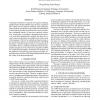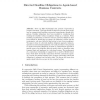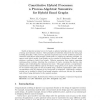2024 search results - page 272 / 405 » A Formal Model of Multi-agent Computations |
131
click to vote
HLPPP
1991
15 years 3 months ago
1991
Swarm is a computational model which extends the UNITY model in three important ways: (1) UNITY’s fixed set of variables is replaced by an unbounded set of tuples which are add...
107
click to vote
NGC
1998
Springer
14 years 11 months ago
1998
Springer
Much progress has been made in distributed computing in the areas of distribution structure, open computing, fault tolerance, and security. Yet, writing distributed applications r...
72
Voted
ICMCS
2007
IEEE
15 years 5 months ago
2007
IEEE
Contextual information is important for sequence modeling. Hidden Markov Models (HMMs) and extensions, which have been widely used for sequence modeling, make simplifying, often u...
95
Voted
ATAL
2009
Springer
15 years 17 days ago
2009
Springer
There are B2B relationships that presume cooperation in contract enactment. This issue should be taken into account when modeling, for computational handling, contractual commitmen...
97
Voted
SIMULATION
2008
14 years 11 months ago
2008
Models of physical systems have to be based on physical principles such as conservation of energy and continuity of power. These principles are inherently enforced by the bond gra...



